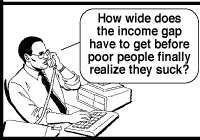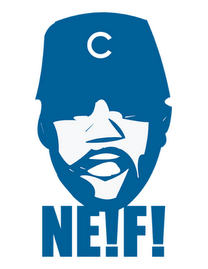Most of life works by spontaneous order. It characterizes how we choose our jobs, hobbies, associates, recreation, etc. When politicians try to regulate the process, they usually make life worse.
I try to demonstrate that in my upcoming ABC TV special, "John Stossel's Politically Incorrect Guide to Politics." I centrally planned a skating rink, and stood in the center of the ice and shouted through a bullhorn: "Slow down! Turn right. No backwards skating!" It didn't work. People hated it. Some fell, just as predicted by George Mason University professor Daniel Klein, who came up with the idea.
Friday, October 17, 2008
LoC's favorite ABC newsman on again tonight
Subscribe to:
Post Comments (Atom)
























3 comments:
Presumably they would have at least arrested any skaters who stuck their blade in the throat of Boitano or perhaps more apropos for the market comparison - melted the ice.
Who's to stop certain big and intimidating skaters from throwing some of the smaller skaters off the rink? I suppose they could retaliate by melting the ice. But what if there were other big skaters waiting to imprison the smaller ones, and then the bigger skaters agree to take turns skating and watching over the smaller skaters? Is that a better outcome?
In this article I loved the following: True Natural Law economics is not laissez faire it is structured guidance, like the rules in a football game. It's a bad idea to give 22 men pads, helmets and a football and say laissez faire, unless you want every one to get killed.
I think that's how most people see it - we want enough rules so we don't kill each other, but not so much that things stall. Presumably the goal in the skating example is for people to have fun while sharing the rink. The rules imposed get you the sharing the rink part, but no fun. Taking the rules away allow for fun, but I'm sure safety would decrease as the number of people on the rink increase (or maybe less people on the rink would cause skaters to go faster and that would also decrease safety).
But how do we balance out the laws that we need to stop from killing each other vs the ones that just slow us down? I'm guessing that equilibrium will never arrive. We'll probably get closer & closer though. And did they ever think that sometimes you set rules so you can figure out that they suck, and why they suck? We've been experimenting since the dawn of time, and we will be until our sun goes nova or Jesus' return, whichver comes first.
Absolutely, Fung, I am 100% with you. The classic problems of political economy, as you so admirably lay them out, are in some sense intractable. Why else would the debates seemingly continue forever with no clear resolution?
Within certain bounds, though, I think Stossel/Klein/etc. think it's the liberty side which is often underappreciated. Olbermann, for instance, has a complete knee-jerk reaction that regulation=good, deregulation=bad. And Obama doesn't strike me as ever having read Adam Smith, frankly. So... accepting the tug-of-war vision of political economy that you lay out, the question is, which side of "good" are we on, in different areas? The "rinkonomics" example can actually be construed to suggest things aren't too bad -- we don't, after all, have centrally planned ice skating. :)
Post a Comment